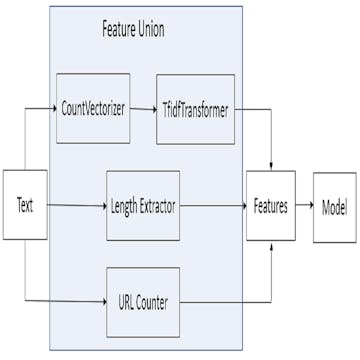
Good to know
Save this course
Reviews summary
Nlp pipeline development with scikit-learn
Activities
Review Python programming fundamentals
Show steps
Strengthen your foundation in Python programming before starting the course.
Browse courses on
Python
Show steps
-
Review online tutorials or documentation on Python syntax and basic data structures.
-
Complete practice problems or exercises to test your understanding.
Read 'Natural Language Processing with Python: Analyzing Text with the Natural Language Toolkit'
Show steps
Review the fundamentals of natural language processing (NLP) and text analysis by reading a book that covers these topics.
View
Natural Language Processing with Python:...
on Amazon
Show steps
-
Purchase and read the book.
-
Take notes on key concepts and techniques.
-
Complete the exercises and assignments in the book.
Follow tutorials on NLP topics
Show steps
Expand your knowledge and skills in specific NLP areas by following guided tutorials.
Browse courses on
Natural Language Processing
Show steps
-
Identify areas where you need additional knowledge or skills.
-
Search for and find relevant tutorials.
-
Follow the tutorials and complete the exercises.
Four other activities
Expand to see all activities and additional details
Show all seven activities
Join a study group or discussion forum
Show steps
Connect with other learners and collaborate on NLP-related topics.
Browse courses on
Natural Language Processing
Show steps
-
Find a study group or discussion forum that aligns with your interests.
-
Participate in discussions and ask questions.
-
Share your knowledge and insights with others.
Complete NLP exercises on Kaggle
Show steps
Reinforce your understanding of NLP concepts by practicing on real-world datasets.
Browse courses on
Natural Language Processing
Show steps
-
Create an account on Kaggle.
-
Find and join NLP competitions or datasets.
-
Submit your solutions and compare them with others.
Write a blog post or article on NLP
Show steps
Share your knowledge and understanding of NLP by writing a blog post or article.
Browse courses on
Natural Language Processing
Show steps
-
Choose a topic related to NLP.
-
Research and gather information.
-
Write and edit the blog post or article.
-
Publish and promote your content.
Record a video tutorial on NLP
Show steps
Contribute to the community and share your knowledge by creating a video tutorial on NLP.
Browse courses on
Natural Language Processing
Show steps
-
Choose a topic that you are knowledgeable about.
-
Create an outline and storyboard for your video.
-
Record and edit your video.
-
Publish and promote your video tutorial.
Review Python programming fundamentals
Show steps
Strengthen your foundation in Python programming before starting the course.
Browse courses on
Python
Show steps
- Review online tutorials or documentation on Python syntax and basic data structures.
- Complete practice problems or exercises to test your understanding.
Read 'Natural Language Processing with Python: Analyzing Text with the Natural Language Toolkit'
Show steps
Review the fundamentals of natural language processing (NLP) and text analysis by reading a book that covers these topics.
View
Natural Language Processing with Python:...
on Amazon
Show steps
- Purchase and read the book.
- Take notes on key concepts and techniques.
- Complete the exercises and assignments in the book.
Follow tutorials on NLP topics
Show steps
Expand your knowledge and skills in specific NLP areas by following guided tutorials.
Browse courses on
Natural Language Processing
Show steps
- Identify areas where you need additional knowledge or skills.
- Search for and find relevant tutorials.
- Follow the tutorials and complete the exercises.
Join a study group or discussion forum
Show steps
Connect with other learners and collaborate on NLP-related topics.
Browse courses on
Natural Language Processing
Show steps
- Find a study group or discussion forum that aligns with your interests.
- Participate in discussions and ask questions.
- Share your knowledge and insights with others.
Complete NLP exercises on Kaggle
Show steps
Reinforce your understanding of NLP concepts by practicing on real-world datasets.
Browse courses on
Natural Language Processing
Show steps
- Create an account on Kaggle.
- Find and join NLP competitions or datasets.
- Submit your solutions and compare them with others.
Write a blog post or article on NLP
Show steps
Share your knowledge and understanding of NLP by writing a blog post or article.
Browse courses on
Natural Language Processing
Show steps
- Choose a topic related to NLP.
- Research and gather information.
- Write and edit the blog post or article.
- Publish and promote your content.
Record a video tutorial on NLP
Show steps
Contribute to the community and share your knowledge by creating a video tutorial on NLP.
Browse courses on
Natural Language Processing
Show steps
- Choose a topic that you are knowledgeable about.
- Create an outline and storyboard for your video.
- Record and edit your video.
- Publish and promote your video tutorial.
Career center
Marketing Manager
Project Manager
Sales Manager
Data Scientist
Machine Learning Engineer
Business Analyst
Software Engineer
Product Manager
Operations Manager
Portfolio Manager
Risk Manager
Customer Success Manager
Program Manager
Natural Language Processing Engineer
Compliance Manager
Reading list
Share
Similar courses
OpenCourser helps millions of learners each year. People visit us to learn workspace skills, ace their exams, and nurture their curiosity.
Our extensive catalog contains over 50,000 courses and twice as many books. Browse by search, by topic, or even by career interests. We'll match you to the right resources quickly.
Find this site helpful? Tell a friend about us.
We're supported by our community of learners. When you purchase or subscribe to courses and programs or purchase books, we may earn a commission from our partners.
Your purchases help us maintain our catalog and keep our servers humming without ads.
Thank you for supporting OpenCourser.



